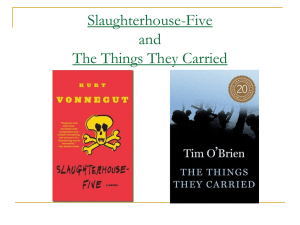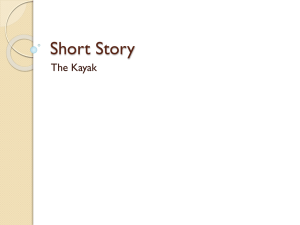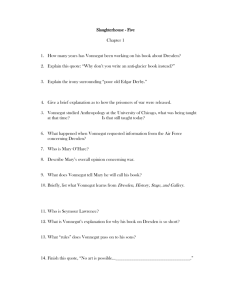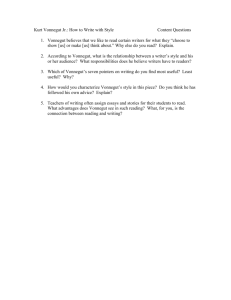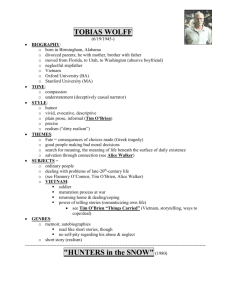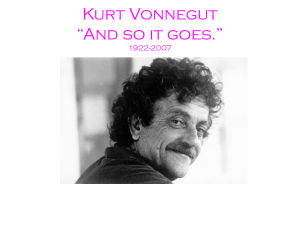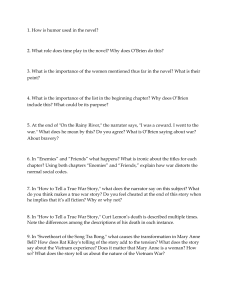Slaughterhouse Five
advertisement
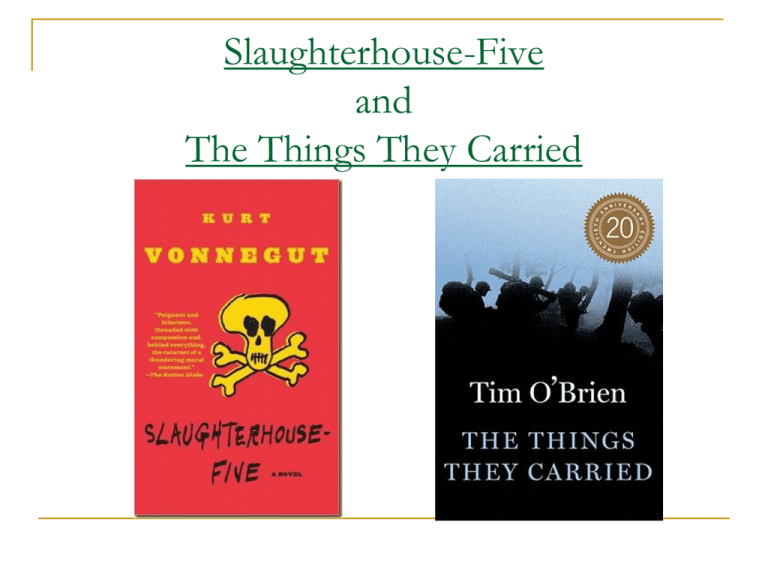
Slaughterhouse-Five and The Things They Carried Food for Thought: Quickwrite Only the dead have seen the end of war. George Santayana Does the quote above hold truth? Why or why not? Is war necessary? Explain. ENG 2H ESSENTIAL QUESTION What is the author’s purpose in writing the novel? What message is he/she trying to convey to his/her audience? TPS: How do we figure this out? Kurt Vonnegut Born November 11, 1922, in Indianapolis, Indiana Died April 12, 2007 in New York, New York Education Attended Cornell University; majored in chemistry and biology After college, Vonnegut enlisted in the United States Army, serving in the World War II Following the war, Vonnegut studied anthropology at the University of Chicago World War II Experiences as POW in Germany had profound influence of his writing, including Slaughterhouse Five. While a POW, witnessed firsthand the firebombing of Dresden, Germany, by Allied forces in 1945. Experience in Dresden = the basis for Slaughterhouse-Five, which was published in 1969 Vonnegut on what he saw in Dresden “The firebombing of Dresden,” Vonnegut wrote, “was a work of art.” It was, he added, “a tower of smoke and flame to commemorate the rage and heartbreak of so many who had had their lives warped or ruined by the indescribable greed and vanity and cruelty of Germany.” Critical Reception and Censorship Slaughterhouse Five, wrote the critic Jerome Klinkowitz, “so perfectly caught America’s transformative mood that its story and structure became best-selling metaphors for the new age.” Novel reached No.1 on best-seller lists, making Vonnegut a cult hero. Some schools and libraries have banned it because of its sexual content, rough language and scenes of violence. “So it goes.” “Robert Kennedy, whose summer home is eight miles from the home I live in all year round,” Vonnegut wrote at the end of Slaughterhouse Five, “was shot two nights ago. He died last night. So it goes.” “Martin Luther King was shot a month ago. He died, too. So it goes. And every day my Government gives me a count of corpses created by military science in Vietnam. So it goes.” “So it goes.” One of many repeated, mantra-like words and phrases that run through Vonnegut’s books, “so it goes” became a catchphrase for opponents of the Vietnam war. Why might this phrase resonate with an anti-war audience? CHAPTER ONE Key to the novel is the opening section in which, apparently, the author speaks in his own voice about a visit he made to talk with an old war buddy, Barnard V. O'Hare, as he was completing the manuscript for the novel. It explains how the novel came to be outfitted with its subtitle ("Or The Children's Crusade | A Duty-Dance with Death") and how it came to be dedicated to O'Hare's wife. The Things They Carried An introduction to Tim O’Brien and his fictional account of the Vietnam War Fiction vs. Non-Fiction It is ALL fiction TPS: Are facts what O’Brien values? Or is it the emotional effect of incidents that is important? Tim O’Brien (author) vs. “Tim O’Brien” (character, narrator) Protagonist and narrator is “Tim O’Brien”. This “Tim O’Brien” in the book is NOT REAL. Even when “Tim O’Brien” talks directly to the reader, it is the fictional “Tim”. Tim O’Brien The author Tim did actually go to Vietnam and really was in the Alpha Company, but is writing a fictional account. Abbreviations found in The Things They Carried Abbreviation Part of speech Definition SOP N Standard Operating Procedure CO N Commanding Officer PFC N Private First Class (rank) RTO N Radio Transmissions Officer LP N Language/Listening Patrol CS N Tear gas MRE N Meal ready to eat VC N Viet Cong HW: Vonnegut Article Read the news article that contains Vonnegut’s obituary. Take notes in the margin on the important and relevant information Circle any words that you need clarification on Write a one paragraph response to our essential question: What was Vonnegut’s purpose in writing the novel? We will discuss the article as a class on Monday
